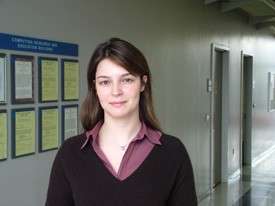Rutgers computer scientists receive Google grant to develop personalized data search system

(Phys.org) —An app that responds to search terms as personal as "that restaurant I visited on a rainy day last spring" could someday be a reality thanks to Rutgers researchers.
Computer scientists Amelie Marian and Thu D. Nguyen received a $62,500 grant from Google to develop a personal data search system that draws from social media pages, email, Skype conversations and work documents, among other things.
The new method of data retrieval mimics the way human memory helps us search for lost items—by making associations and retracing our steps in time and space.
"It's like when you lose your keys. You're not going to search for them by thinking 'red keys' and 'apartment' the way you would use keywords in a Google search. You'd think, 'where was I last? what was I doing the last time I remember having them?'"' explains Marian, an associate professor in the Department of Computer Science.
"As technology evolves at a rapid pace, many evolutional leaps occur in academia,'' says Michael Rennaker, Google's university relations-fellowships manager and research awards specialist. "Professors Marian and Nguyen's research is unique and forward looking."
The duo's system would consolidate many different sources and use them as an online memory pool, which explains the Proustian title of Marian and Nguyen's project: ''Remembrance of Data Past: Using Context in Personal Information Search."
The technology, which would be available as an app, would search mostly personal account information rather than accessing public data and anticipating queries the way Google does.
The duo's system would consolidate many different sources and use them as an online memory pool, which explains the Proustian title of Marian and Nguyen's project: ''Remembrance of Data Past: Using Context in Personal Information Search."
"We have all this digital memory to hold everything we do online, but it's all fragmented. None of its in the same place,'' she says.
"In real life, it's not about finding one file or piece of information. I have hundreds of documents, for instance, that would be called up with the same key word. It's finding a piece of information in context. If I think, 'I remember I was working on that document during a Skype meeting with Bob,' or 'who did I exchange that file with?' and I have a way to search those things, it'll be easier to find."
One inspiration for the project was a Facebook conversation about book recommendations.
"I was on vacation and I wanted to read a book that was mentioned on a friend's page. but she's very active on Facebook, so I knew that if I searched her page for something she posted months ago, I'd never find it,'' Marian remembers.
The system designed by Marian and Nguyen would not only comb social media threads on Facebook, FourSquare, Twitter and Instagram but could also search weather reports and calendars. So if you were searching for something you did when it was snowing, the data can be retrieved. The app could also scan credit card purchases to help you remember the name of a restaurant you visited a year ago.
The method, which wouldn't be available to the public for at least a few years, could also issue reminders that it's time to make a dentist appointment or pay your insurance bill.
"A search app such as the one we propose can have a strong impact on the public,'' says Nguyen. "Consider the Spotlight search service built into the Mac operating system. It would be very convenient to be able to search all of our data repositories from one app, as opposed to individually searching in Gmail, Facebook, etc.''
Marian has been studying the development of new search methods for several years. In 2010, she received grants from both Google and the National Science Foundation to study how users search online health forums and other communities.
She worked on similar technologies to study user-generated restaurant reviews with the goal of helping users pinpoint specific information rather than scrolling through endless threads.
As online life increasingly becomes a shadow of real-time existence, customized searches will become more necessary, according to Marian.
"This is the direction in which the world seems to be moving,'' she says.
Provided by Rutgers University



















